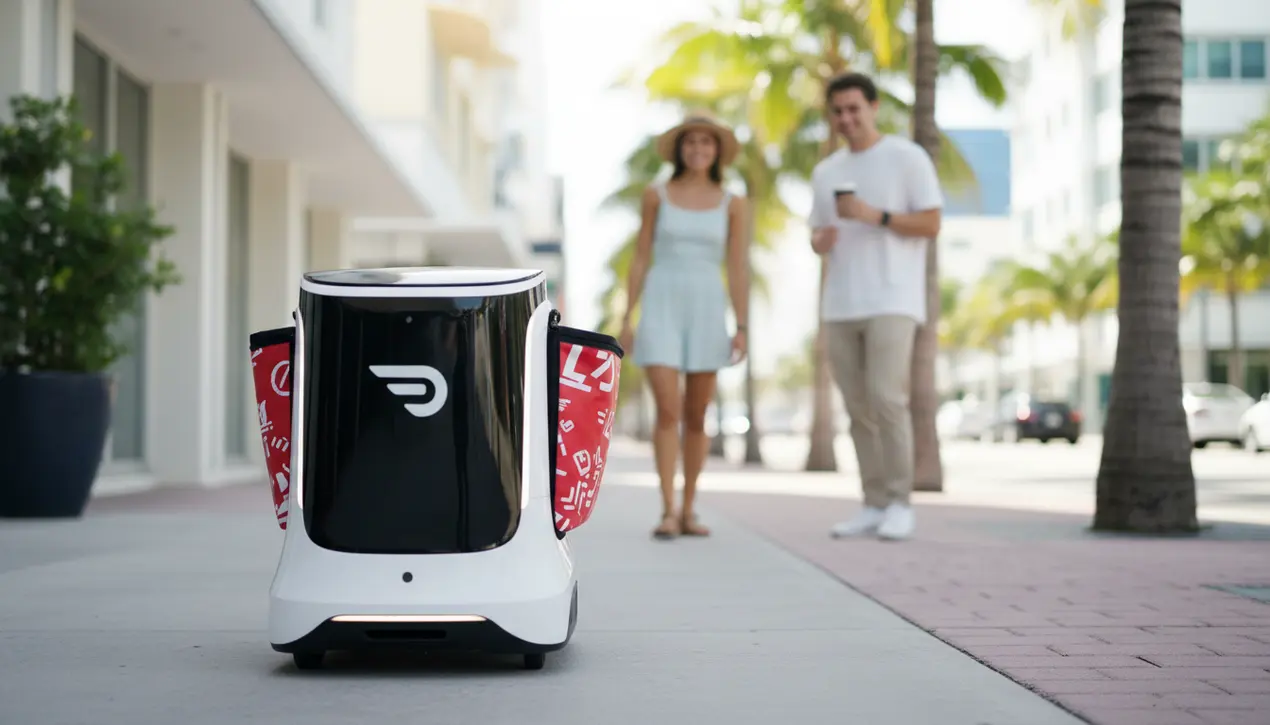
AIroboticsAutonomous Navigation
DoorDash customers in Miami can now receive their food orders from robots
TH
Thomas Green
4 hours ago7 min read
DoorDash is bringing its robot delivery service to Miami, a strategic expansion following its initial forays into Los Angeles and Chicago earlier this year that already enlisted over 600 merchants. This move is part of a broader, ambitious push towards what the company terms a 'multi-modal system'—a sophisticated logistics network designed to seamlessly integrate human couriers, terrestrial robots, and aerial drones to meet surging consumer demand.Partnering once again with Coco Robotics, DoorDash is not merely adding a third city to its automated roster but is significantly broadening the scope of what these rolling emissaries can carry. For the first time, orders from DashMart—the company's own delivery-only convenience store chain stocking groceries and household essentials—will be funneled through these autonomous units.This pivot means Miami residents will soon receive everything from a late-night snack to a gallon of milk via a quiet, electric-powered robot, a development that signals a fundamental shift from restaurant-only deliveries to a more comprehensive, automated last-mile solution for urban commerce. The engine behind this technological charge is DoorDash Labs, a dedicated division focused on robotics and automation, which is actively forging new partnerships to scale these environmentally friendly delivery methods.This vision extends beyond the sidewalk; earlier this year, the company launched drone deliveries in Charlotte through a collaboration with Wing, Alphabet's aviation arm, demonstrating a commitment to conquering both the terrestrial and aerial domains of the delivery landscape. While leveraging Coco's established self-driving robots, DoorDash has also flexed its own engineering muscle by introducing 'Dot,' an endearingly designed in-house delivery robot built for quick neighborhood trips.Unlike its more utilitarian counterparts, Dot is engineered with a distinct aesthetic, described as decidedly cuter, and possesses the versatility to navigate not just roads but also bike lanes and sidewalks with an agility that mirrors a human pedestrian's pathfinding. Currently in a pilot phase in Arizona, Dot represents the next evolutionary step, anticipated to eventually fulfill lower-cost deliveries, with DoorDash carefully assuring its vast fleet of human delivery personnel that these machines are intended to complement their work, not replace it—a crucial narrative in an industry powered by gig labor.This entire sector is in a state of rapid, fascinating flux. With fully autonomous technology still in its relative infancy, these lower-risk, hyper-local deliveries are becoming a fertile testing ground for numerous food delivery giants who have traditionally relied entirely on human contractors.The parallel is clear in GrubHub's own strategic maneuver at the beginning of the year, partnering with autonomous robot company Avride to scale robot deliveries on college campuses like Ohio State University. This isn't just about convenience; it's a grand experiment in urban logistics, a real-world test bed for how our cities will function when goods move through them with a new kind of intelligence.The implications stretch from reducing carbon emissions and traffic congestion to redefining the very nature of local retail and employment. It’s a small step for a robot rolling down a Miami street, but a giant leap for the ecosystem of how we acquire our daily necessities, echoing the same kind of paradigm-shifting ambition that drives ventures to Mars—a reimagining of a fundamental human activity through the lens of technology and scale.
#DoorDash
#robot delivery
#autonomous vehicles
#food delivery
#logistics
#Miami
#Coco Robotics
#Dot
#featured
Stay Informed. Act Smarter.
Get weekly highlights, major headlines, and expert insights — then put your knowledge to work in our live prediction markets.
Related News
Comments
Loading comments...
© 2025 Outpoll Service LTD. All rights reserved.